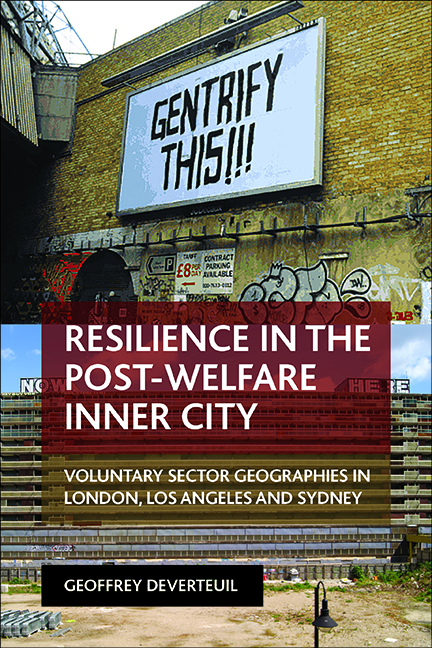 Resilience in the Post-Welfare Inner City
Resilience in the Post-Welfare Inner City Book contents
- Frontmatter
- Dedication
- Contents
- List of tables and figures
- About the author
- Acknowledgements
- Preface
- Part One Introducing resilience in the post-welfare inner city: conceptual and methodological considerations
- Part Two Case studies: spatial and social resilience in London, Los Angeles and Sydney
- Part Three Conclusions, critical resilience, commons and austerity
- References
- Index
Preface
Published online by Cambridge University Press: 10 March 2022
- Frontmatter
- Dedication
- Contents
- List of tables and figures
- About the author
- Acknowledgements
- Preface
- Part One Introducing resilience in the post-welfare inner city: conceptual and methodological considerations
- Part Two Case studies: spatial and social resilience in London, Los Angeles and Sydney
- Part Three Conclusions, critical resilience, commons and austerity
- References
- Index
Summary
The focal point for this book is the ‘how’ of resilience, the on-the-ground processes surrounding the fate of residual inner-city areas deemed ‘service hubs’ (for example, clusters of voluntary-sector organisations) faced with the threat of gentrification-induced displacement. Put as a question, what accounts for their resilience when other arrangements of collective consumption (especially social housing) have been severely curtailed or fallen by the wayside entirely? After all, even those most convinced of pervasive neoliberalism acknowledge that residual mechanisms of support, survival and ‘staying put’ from bygone eras persist in the city – it is just that they ignore or assume away the resilience inherent in this process, the actual means of resilience, the agents of resilience, the consequences of such resilience and how these tendencies may differ comparatively. These empirical and conceptual gaps will map on to five cornerstones that structure the book: neoliberalism and post-welfarism as the context and the threat; resilience as the response and the organising concept; the voluntary sector as the agent; the inner city as the territorial focus; and comparison as the method. Empirically and comparatively, I wish to see how processes of resilience play out across 10 different inner-city neighbourhoods in three global city-regions (London, Los Angeles and Sydney), in an attempt to learn from these places, alert to differences and similarities.
The book makes the following contributions. First, I will bring critical intent to the concept of resilience, the production of which is usually seen as regressively status quo, by developing what I deem a ‘critical resilience of the residuals’, whereby the relics of previously more equitable (Keynesian) arrangements are protected and defended. Second, I will present a more ambivalent, if not supportive, version of the voluntary sector. Third, I will advance a more complex interpretation of inner-city territory, one buffeted by multiple motivations that can breed resilience, rather than advancing a purely punitive representation. Fourth and finally, my comparative approach will valorise overlooked, ordinary agents and practices (of care, sustenance, abeyance) within global-city regions, and propose novel approaches to comparing the voluntary sector and resilience. Further, I will use the rich empirical material to explore the degree of similarity and difference across the Australian, UK and US welfare states and voluntary-sector settlements. The results suggested that the more uneven and autonomous, yet increasingly skeletal US welfare settlement contrasted with the more supported and centralised (yet relatively inflexible) Australian and UK systems.
- Type
- Chapter
- Information
- Resilience in the Post-Welfare Inner CityVoluntary Sector Geographies in London, Los Angeles and Sydney, pp. xi - xiiPublisher: Bristol University PressPrint publication year: 2015


